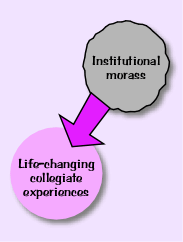
Rather than make bids of academic respectability, I foresee these breakout institutions seeking cultural relevancy and historical legitimacy. As the research institutes abandon their pretense of teaching undergraduates, these campuses for college experiences can stop aspiring to do impressive and cutting edge research. An emphasis on quality teaching can become the mission here. Recognition can be based on learning outcomes, rather than useless "publish or perish" pressures. The bottom line will get revised to the quantity and quality of life changing experiences absorbed by the college students, not the ranking of the school, prestige of the faculty or advances in research on campus.
Stringent academics will disparage these campuses as "party schools", "dating games", "country clubs" and "buffets of cake courses". They won't understand the value proposition, the job getting done by the students or the quality experiences being provided. These campuses will bring an end to the torture of "choosing a major". Every major will be self-defined or improvised/never defined. There is no need to limit oneself or commit to a course of study. An academic focus misses the point here. This is a personal exploration that uses coursework and collegiate experiences to that end. The outcry against "NCAA athletics undermining scholastic achievement" can also be put to rest. The confabulation of athletic and academic standards gets dismantled in this model.
As I mentioned previously, "Most residential colleges demonstrate "student life" as a core competency. The "Dean of Students" and "Director of Athletics" oversee the "rite of passage" for thousands of young adults." The sporting events, concerts, conferences, study groups, fraternities/sororities and so much more create enduring memories. The immersion in so much social contact enables each students to find themselves in how much they have in common and in contrast with other individuals. Focusing of the "Value-Added Process" of college experiences can serve to lower tuition cost, institutional overhead and inefficiencies brought on by conflicting ambitions.
Perhaps there will be two kinds: big and small campuses with different student bodies, curriculum emphases, faculty interests and approaches to scholarship. There may be specialization of offerings within them also. Yet together, they will deliver valuable educations with disregard for the diploma. They students will learn to appreciate what they see, compare what differs, realize what is hidden, sense what is suggested, and explore what is puzzling. They will escape rote learning to reflect deeply and come to their own conclusions.
The big campuses may offer classes in Harry Potter, Star Wars, Lord of the Rings and music pop icons. Their big sporting events attracts a students who are immersed in the consumer culture. They will want to better understand the media and marketing they've been saturated with already and expect to be absorbed with for decades hence. Graduates could go into media production, advertising, sales, social outreach programs and any other careers that call for being in tune with the times. These graduates will become enduring sports fans, active alumni and fun parents.
The smaller campuses could explore literature, philosophy, traditions in every art form, and history from dozens of perspectives. They would reveal the established patterns that persist in current situations, expressions and conflicts. They could situate the new creations by the students amidst long timelines of civilized developments. Graduates could handle responsibilities that call for deep insights and broad perspectives. These students will become avid readers, patrons of the local arts scene and wise parents.
These campuses will function like modern-day finishing schools. Their mission includes seeing that the students mature a great deal while enrolled. They will offer role models, challenging experiences and colleagial contacts that stimulate students' character development, value judgments, and insights into others. Expertise gleaned from therapy and social work can enhance these "rites of passage", initiations into adulthood and transitions into personal responsibilities. As they demonstrate this competency to the parents of the students, the current plague of helicopter parents is apt to subside.
No comments:
Post a Comment